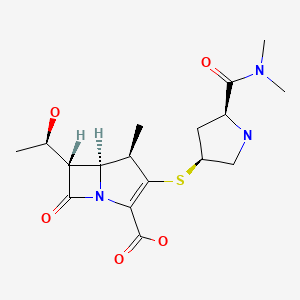Attribution Statement: LactMed is a registered trademark of the U.S. Department of Health and Human Services.
NCBI Bookshelf. A service of the National Library of Medicine, National Institutes of Health.
Drugs and Lactation Database (LactMed®) [Internet]. Bethesda (MD): National Institute of Child Health and Human Development; 2006-.
CASRN: 96036-03-2

Drug Levels and Effects
Summary of Use during Lactation
Although no information is available on the use of meropenem during breastfeeding, milk levels appear to be low and beta-lactams are generally not expected to cause adverse effects in breastfed infants. Occasionally disruption of the infant's gastrointestinal flora, resulting in diarrhea or thrush have been reported with beta-lactams, but these effects have not been adequately evaluated. Vaborbactam, which is available in combination with meropenem in the product Vabomere, has not been studied in nursing mothers, but the combination is expected to have similar concerns as with meropenem alone.
Drug Levels
Maternal Levels. A woman with a history of NYHA class I heart failure was 3 days postpartum and developed a urinary tract infection and was treated with cephalexin until it was found that the organism was resistant to extended-spectrum beta-lactams. On day 6 postpartum, meropenem 1 gram IV every 8 hours was started. Five samples of hindmilk were obtained from day 6 to day 9 postpartum over 37 hours. The highest measured level was 644 mcg/L and the lowest was 246 mcg/L. Over the collection period the average breastmilk level was 480 mcg/L. The average infant intake was estimated to be 71 mcg/kg daily, which was 0.13% of the weight-adjusted maternal dosage. The maximum infant intake was estimated to be 97 mcg/kg daily, which was 0.18% of the weight-adjusted maternal dosage.[1]
Infant Levels. Relevant published information was not found as of the revision date.
Effects in Breastfed Infants
A mother received meropenem 1 gram IV every 8 hours for 7 days while exclusively breastfeeding her newborn. When questioned later, she stated that her infant had no oral thrush, watery diarrhea, or diaper dermatitis that required antifungal therapy during the month following her meropenem therapy.[1]
An infant was breastfed (extent not stated) until the 4th month postpartum. At 2 months of age, his mother was given a 2-week course of tobramycin and meropenem (dosage not specified) for a cystic fibrosis exacerbation. The infant displayed no change in stool pattern during the maternal treatment and had normal renal function at 6 months of age.[2]
Effects on Lactation and Breastmilk
Relevant published information was not found as of the revision date.
References
- 1.
- Sauberan JB, Bradley JS, Blumer J, et al. Transmission of meropenem in breast milk. Pediatr Infect Dis J. 2012;31:832–4. [PubMed: 22544050]
- 2.
- Festini F, Ciuti R, Taccetti G, et al. Breast-feeding in a woman with cystic fibrosis undergoing antibiotic intravenous treatment. J Matern Fetal Neonatal Med. 2006;19:375–6. [PubMed: 16801316]
Substance Identification
Substance Name
Meropenem
CAS Registry Number
96036-03-2
Disclaimer: Information presented in this database is not meant as a substitute for professional judgment. You should consult your healthcare provider for breastfeeding advice related to your particular situation. The U.S. government does not warrant or assume any liability or responsibility for the accuracy or completeness of the information on this Site.
- User and Medical Advice Disclaimer
- Drugs and Lactation Database (LactMed) - Record Format
- LactMed - Database Creation and Peer Review Process
- Fact Sheet. Drugs and Lactation Database (LactMed)
- Drugs and Lactation Database (LactMed) - Glossary
- LactMed Selected References
- Drugs and Lactation Database (LactMed) - About Dietary Supplements
- Breastfeeding Links
- PubChem SubstanceRelated PubChem Substances
- PubMedLinks to PubMed
- Review Doripenem.[Drugs and Lactation Database (...]Review Doripenem.. Drugs and Lactation Database (LactMed®). 2006
- Review Ertapenem.[Drugs and Lactation Database (...]Review Ertapenem.. Drugs and Lactation Database (LactMed®). 2006
- Review Imipenem and Cilastatin.[Drugs and Lactation Database (...]Review Imipenem and Cilastatin.. Drugs and Lactation Database (LactMed®). 2006
- Review Cefazolin.[Drugs and Lactation Database (...]Review Cefazolin.. Drugs and Lactation Database (LactMed®). 2006
- Review Cefotetan.[Drugs and Lactation Database (...]Review Cefotetan.. Drugs and Lactation Database (LactMed®). 2006
- Meropenem - Drugs and Lactation Database (LactMed®)Meropenem - Drugs and Lactation Database (LactMed®)
Your browsing activity is empty.
Activity recording is turned off.
See more...
